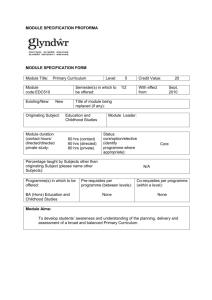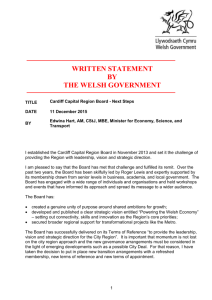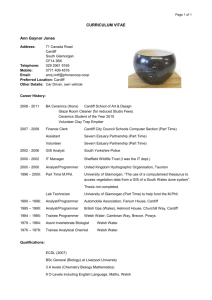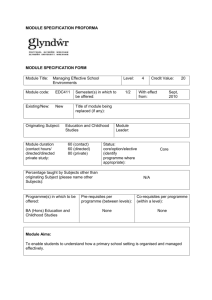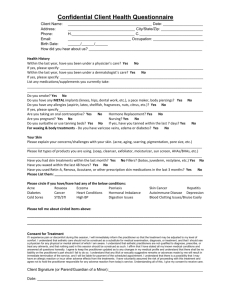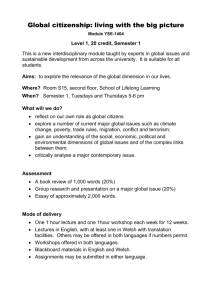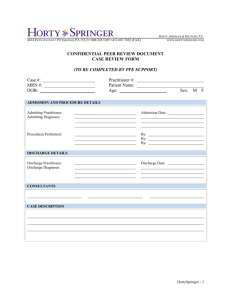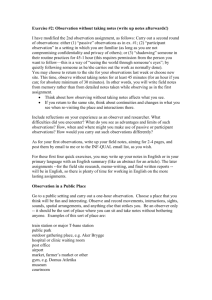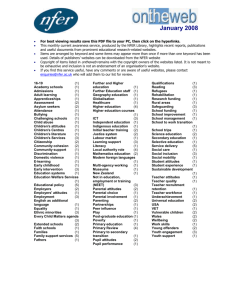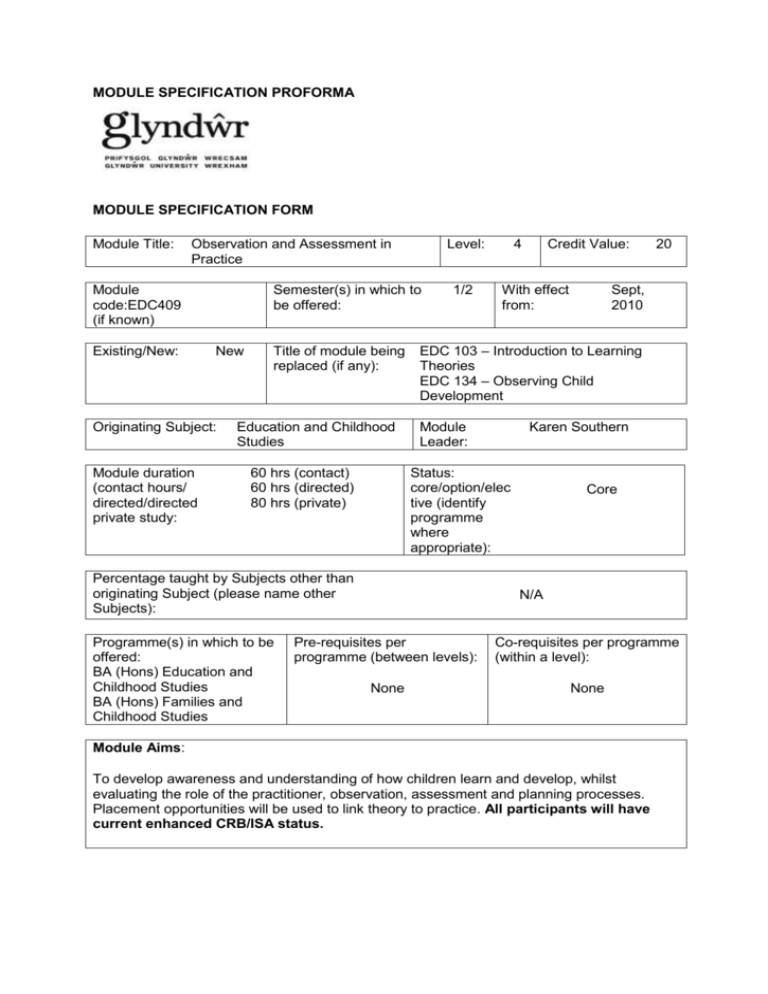
MODULE SPECIFICATION PROFORMA
MODULE SPECIFICATION FORM
Module Title:
Observation and Assessment in
Practice
Module
code:EDC409
(if known)
Existing/New:
Semester(s) in which to
be offered:
New
Originating Subject:
Module duration
(contact hours/
directed/directed
private study:
Level:
Title of module being
replaced (if any):
Education and Childhood
Studies
60 hrs (contact)
60 hrs (directed)
80 hrs (private)
1/2
Credit Value:
With effect
from:
20
Sept,
2010
EDC 103 – Introduction to Learning
Theories
EDC 134 – Observing Child
Development
Module
Leader:
Karen Southern
Status:
core/option/elec
tive (identify
programme
where
appropriate):
Percentage taught by Subjects other than
originating Subject (please name other
Subjects):
Programme(s) in which to be
offered:
BA (Hons) Education and
Childhood Studies
BA (Hons) Families and
Childhood Studies
4
Core
N/A
Pre-requisites per
programme (between levels):
Co-requisites per programme
(within a level):
None
None
Module Aims:
To develop awareness and understanding of how children learn and develop, whilst
evaluating the role of the practitioner, observation, assessment and planning processes.
Placement opportunities will be used to link theory to practice. All participants will have
current enhanced CRB/ISA status.
Expected Learning Outcomes
At the end of this module, students should be able to:
Knowledge and Understanding:
1. Acknowledge a range of theoretical perspectives and a range of factors in relation to
children’s learning and development;
2. Identify, discuss and justify observation techniques which could be used when
working with children, young people and families;
Undertake and evaluate observations within the work/placement setting;
Evaluate the need for and effectiveness of reporting to other professionals, parents
and carers;
Investigate the role of the practitioner/adult in the observation and assessment
process;
Evaluate and reflect upon their own skills, drawing together strategies for future
development.
3.
4.
5.
6.
Transferable/Key Skills and other attributes:
Communication verbally and in writing;
Observation skills;
Time management and management of own learning;
Self appraisal/reflection and evaluation;
Working with others;
Making links between theory and practice;
ICT skills.
Assessment: please indicate the type(s) of assessment (eg examination, oral, coursework,
project) and the weighting of each (%). Details of indicative assessment tasks must be
included.
1. Portfolio containing:
theory behind role/use/choice of observation;
a minimum of 3 completed and evaluated observations – linked to theory;
ethics and frameworks for sharing information with others;
self-reflection and evaluation.
Assessment
1
Learning
Outcomes to be
met
All
Type of assessment
Weighting
Portfolio
100%
Word count or
equivalent if
appropriate
c4,000
Learning and Teaching Strategies:
Delivery will be facilitated via lectures, seminars, group work, placement opportunities, group
and individual tutorials, feedback and discussion. Students will be given ‘hands on’ practical
tasks linked to observations of individuals, groups and the environment, to undertake and
evaluate to enhance confidence, use of observation/assessment, links to learning and
developmental theory, adult/practitioner roles.
Syllabus outline:
The ability to observe and record a range of situations, environments and behaviours is
an essential skill for any practitioner working with children, young people and families.
Routine observation and assessment is vital to detect and diagnose a range of issues. It
is good practice to carry out observation and assessment in order to check that activities
and strategies being used are having beneficial effects.
The main factors of physical, social, cognitive, linguistic and emotional skills will be
examined and their inter-relationship in the development of children and young people.
Theories relating to child development will be discussed and common stages through
which children progress will be identified.
Discussion of the process of learning – behaviourist; cognitive; constructivist; humanistic.
Key government documentation/policies (e.g. ‘Play/Active Learning. Overview for 3 to 7 year olds’ (DCELLS, 2008); ‘Observing Children’ (DCELLS, 2008).
Discussion of the process of learning – behaviourist; cognitive; constructivist; humanistic.
Factors that influence learning and development (nature/nurture).
Introduction to and discussion of a range of observation techniques – how/when/ where/
why these could be used.
Opportunities for observing and recording via ‘prepared’ and ‘real’ situations and within
settings and relating these findings to module content will be provided.
The practitioner’s role within the observation/assessment process will be explored,
including issues of participation; objectivity; subjectivity; recording; ethics; confidentiality;
data protection and communication of findings.
Bibliography
Essential reading:
Doherty, J. and Hughes, M. (2009), Child Development: Theory and Practice 0 – 11. Harlow:
Pearson Longman.
Fabian, H. and Mould, C. (eds) (2009), Development and Learning for Very Young Children.
London: Sage.
Hobart, C. and Frankel, J. (2004), A Practical Guide to Child Observation and Assessment.
Third Edition. Cheltenham: Nelson Thornes.
Lindon, J. (2005), Understanding Child Development- Linking Theory to Practice. London:
Hodder Arnold.
Lindon, J. (2007), Understanding Children and Young People – Development from 5-15
years. London: Hodder Arnold.
Macleod-Brudenell, I. and Kay, J. (eds) (2008), Advanced Early Years. Second Edition.
Oxford: Heinemann.
Riddall-Leech, S. (2005), How to Observe Children. Oxford: Heinemann.
Robinson, M. (2008), Child Development 0 – 8: A Journey through the Early Years.
Maidenhead: McGraw Hill/Open University Press.
Sharman, C., Cross, W. and Vennis, D. (2007), Observing Children and Young People.
Fourth Edition. London: Continuum.
Other indicative reading:
Boyd, D. and Bee, H. (2009), Lifespan Development. Boston: Pearson/Allyn and Bacon.
Department for Education and Skills (2005), An Overview of Cross Government Guidance.
Every Child Matters Change for Children. London: Her Majesty’s Government.
Department for Education and Skills (2007), Practice Guidance for the Learning,
Development and Care for Children from Birth to Five. Annesley: DfES Publications.
Department for Children, Education, Lifelong Learning and Skills, (2008), Framework for
Children’s Learning for 3 to 7-year-olds in Wales. Cardiff: Welsh Assembly Government.
Department for Children, Education, Lifelong Learning and Skills (2008), Observing Children.
Cardiff: Welsh Assembly Government.
Department for Children, Education, Lifelong Learning and Skills, (2008), Learning and
Teaching Pedagogy. Cardiff: Welsh Assembly Government.
Department for Children, Education, Lifelong Learning and Skills (2008), Play/Active
Learning. Overview for 3 to 7 - year - olds. Cardiff: Welsh Assembly Government.
Department for Children, Schools and Families (2009), The National Strategies Early Years.
Learning, Playing and Interacting. Good Practice in the Early Years Foundation Stage.
Annesley: DCSF Publications.
Robinson, M. (2008), Child Development 0 – 8: A Journey through the Early Years.
Maidenhead: McGraw Hill/Open University Press.
Useful web-sites:
http://wales.gov.uk/topics/educationandskills/curriculumassessment/arevisedcurriculumforwa
les/foundationphase/?lang=en
http://nationalstrategies.standards.dcsf.gov.uk/earlyyears
http://www.dcsf.gov.uk/everychildmatters/

